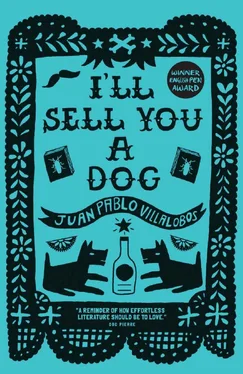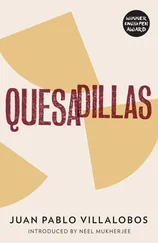‘If you didn’t drink so much you would have got up and caught her red-handed. Supposing she did come in, that is. You’re being paranoid, why would she want to come in?’
‘To look for the Lost Times .’
‘She could have done that before. She doesn’t need to now, she’s got you by the you-know-whats.’
‘That’s a bit of an exaggeration, Juliette .’
‘No it’s not, it’s true.’
‘By the way, did you talk to Dorotea?’
‘She promised me she’d give him the message.’
‘I asked you to get hold of Mao’s phone number!’
‘She wouldn’t give it to me, she said it was for our own safety.’
‘Those kids really like playing games, don’t they!’
‘What, and you don’t?’
A boy entered the shop carrying two paper plates of tacos and a large bottle of beer.
‘Hang on,’ Juliet said, ‘don’t eat them yet, I’m going to give you a Serrano chilli to make you feel better.’
She poured out two glasses of beer and held out the chilli after rubbing it between her hands to make it even more savage. Then we ate in silence. She chewed and chewed and I chewed and sweated, drenched from head to foot. The beer performed the miracle of returning me to a state far more comfortable than that of being hung-over: drunk. Juliet brought me a roll of toilet paper so I could wipe the sweat from my face and blow what was starting to drip out of my potato-nose. As I blew, it occurred to me I’d never asked Juliet — who, when you thought about it, was an expert in such things — if it were true my nose had the form of a tuber.
‘Hey, tell me what my nose looks like.’
‘You really want to know? You’re in such a mood today…’
‘Is it a potato?’
‘Yeah, but a Peruvian potato, you know what I mean, those dark-skinned ones.’
I passed her my glass for more beer and as she took it she looked at me, as if trying to calculate the size and nature of my need.
‘Why don’t you have a lie-down?’ she suggested. ‘A little nap would do you good right now.’
‘Sleeping’s the last thing I want to do,’ I replied. ‘I’ve been having some really weird dreams lately.’
‘Erotic dreams?’
‘I’m being serious, for God’s sake! Why does everything have to be a joke?’
‘Because you and I always joke around and, forgive me for saying so, but if it’s jokes we’re talking about then you’re the king of jokes. Now, if you want to be serious, be serious: go ahead, tell me about your dreams.’
‘I don’t want to tell you my dreams, you might start trying to interpret them.’
‘It’d be your fault if I did.’
‘Oh would it now!’
‘Of course, for giving me that trippy book.’
‘Have you been reading it?’
‘Bits of it, before I go to sleep; it’s like a horror film. Wait a minute.’
I watched her as she walked across the patio and went into her room, returning shortly afterwards leafing through the book as she looked for a particular passage. She stood in front of me, turned a few pages over and eventually said:
‘Here it is. Listen to this.’
And she read:
In us is also a dark angel (Hekate was also called angelos), a consciousness (and she was called phosphoros) that shines in the dark… This part has an a priori connection with the underworld through sniffing dogs and bitchery, dark moons, ghosts, garbage and poisons.
She turned a page and then another one, and another, trying to find another bit to read out to me.
‘Doesn’t it give you nightmares?’ I asked.
‘Not on your nelly: I dream of Coatlicue every single night.’
Mao came into the bar dragging behind him the wheelie suitcase he’d taken the Lost Times away in. It was almost 8 p.m. and I’d lost count of how many drinks I’d had some time ago, out of sheer anxiety: so far from my Aesthetic Theory and so close to the old people’s home. He sat down opposite me and starting flexing his right arm, the one he’d used to pull the delivery with.
‘Damn it Mao,’ I said. ‘It was urgent. Didn’t Dorotea give you the message?’
‘We carried the operation out as soon as we could yesterday,’ he replied. ‘We had to bring it forward because of all the pressure you were putting on me.’
‘And?’
‘Complete success.’
‘I’m talking about the Lost Times , I couldn’t care less about your operations; do you have them?’
‘They’re in the suitcase. Can I have a beer?’
‘Get your own beer, kiddo.’
He called to the barman to bring him a Victoria and stared intently at me; so desperate was he to tell me what had happened it looked as if the words were going to start tumbling out of his mouth like little balls.
‘You really don’t want me to tell you?’ he asked.
‘I thought it was a clandestine operation.’
‘You helped the cause, you deserve to know.’
‘You’ve got it all wrong, I don’t have causes, I have problems; since we last saw each other things have got really complicated.’
I must have looked so downcast I imagined he even felt sorry for me, his dreadlocks drooping and depressed.
‘Is there anything I can help you with?’ he asked.
‘For now,’ I said, ‘ you can just wait here with me until the salon members go to bed so we can take the Lost Times up to my apartment. Then you can help me return them.’
‘Whatever you say, Grandpa.’
We drank two or three more beers while I focused on stemming Mao’s verbal diarrhoea as he stubbornly tried to make me an accomplice to his mischief, and then I sent him to have a look at the lobby. He came back and said:
‘All clear.’
Back in my apartment, I opened the suitcase to check its contents and there were the Lost Times , all battered: the corners of the covers were bent, the pages looked wonky and some were loose and, stamped onto the cover of one, the print of a shoe was clearly visible.
‘My God, Mao, what did you do?’
‘I thought you didn’t want me to tell you?’
‘I don’t want you to tell me a thing, but why are they in such a state?’
‘We used them as weapons in the operation, Grandpa.’
‘What operation? The Battle of the Lost Times ?’
‘Shall I tell you or not?’
‘Tell me the minimum, I’m in enough trouble as it is.’
‘The minimum is that we kidnapped a dog.’
‘A dog?’
‘Not just any dog: it belongs to the son of the richest man in the world.’
‘Didn’t that dog die?’
‘They had another one: the Labrador’s little lady-friend. We’re going to demand the ransom in a few days.’
‘I told you I don’t want to know anything. Now, let’s go to the Jardín de Epicuro.’
The next day, Juliet communicated the conditions of the handover to Francesca. The paper I found in my letterbox informed me that the Aesthetic Theory was in my apartment, under the bed. I found it stuffed into the box where I kept the Chinese fortune cookies. Meanwhile, the salonists rescued their Lost Times from the bushes in the Jardín de Epicuro. As their withdrawal symptoms had reached crisis point, they sat down immediately to read on the park benches. And that was where the police arrested them: using the battered books as evidence, they accused them of possession of weapons used in an attempted murder and unlawful deprivation of canine liberty.
The dog had been scratching non-stop at the door to my room, which meant that Mum had left the house without taking him with her. I hated this dog more than any other, even more than the dog that had made my father leave home, more, even, than Turnup, and before he became the definitive symbol of calamity. This dog was a nervous hound, who looked like he was about to have a heart attack even when he was asleep: he’d kick out his legs, tremble, bark and whine at oneiric enemies. My mother had named him Eighty-Three, the year she’d adopted him, because when she’d brought him home a couple of weeks after the demise of the previous animal, my sister had said that the different periods in our lives were marked by Mum’s various mutts. It was true: when we recalled episodes from our past, we didn’t say, that was in the sixties or in the forties, never mind ‘before or after Dad left’, which was the real watershed in the family history. Instead, perhaps to evade the issue, we said: that was when we had Turnup. Or when we had Market, that silky-haired dog who — in my defence, I would like to clarify — had ended up dying of a urinary infection that spread through his entire body and left him swollen like a balloon (and culinarily useless).
Читать дальше












